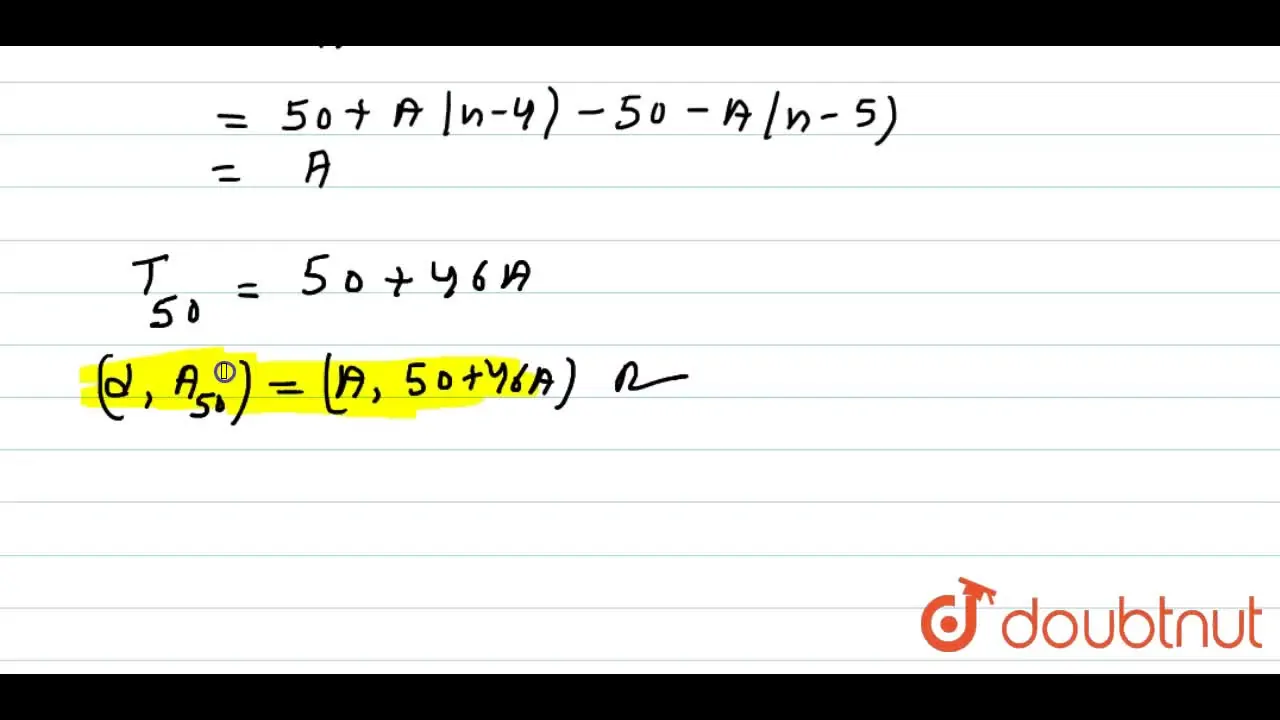Let the sum of the first n terms of a non-constant AP a1,a2,a3....be 50n+n(n−7)2A, where A is a constant. If d is the common difference of this AP, then the ordered pair (d,a50) is equal to
(A,50+46A)
(50,50+45A)
(50,50+46A)
(A,50+45A)
The correct Answer is:A
Key Idea Use the formula of sum of first n terms of AP, i.e., Sn=n2[2a+(n−1)d]
Given AP, is
a1,a2,a3.... Having sum of first n-terms
=n2[2a1+(n−1)d] [where, d is the common difference of AP]
=50n+n(n−7)2A (given)
⇒12[2a1+(n−1)d]=50+n−72A
⇒12[2a1+nd−d]=(50−72A)+n2A
⇒(a1−d2)+nd2=(50−72A)+n2A
On comparing corresponding term, we get
d=Aanda1=50−72A
⇒a1−A2=50−72A [∵d=A]
⇒a1=50−3A
so a50=a1+49d
=(50−3A)+49A [∵d=A]
=50+46A
Therefore, (d,a50)=(A,50+46A)
Related Playlists
- BOOK - IIT JEE PREVIOUS YEARCHAPTER - SEQUENCES AND SERIESEXERCISE - GEOMETRIC PROGRESSION16videos
SEQUENCES AND SERIES
- BOOK - IIT JEE PREVIOUS YEARCHAPTER - SEQUENCES AND SERIESEXERCISE - SUM OF N TERMS & INFINITE TERMS OF A GP14videos
SEQUENCES AND SERIES
- BOOK - IIT JEE PREVIOUS YEARCHAPTER - SEQUENCES AND SERIESEXERCISE - RELATION BETWEEN AM,GM, HM AND SOME SPECIAL SERIES34videos
SEQUENCES AND SERIES
- BOOK - IIT JEE PREVIOUS YEARCHAPTER - RELATIONS AND FUNCTIONS EXERCISE - All Questions1videos
RELATIONS AND FUNCTIONS
- BOOK - IIT JEE PREVIOUS YEARCHAPTER - SOLVED PAPER 2019EXERCISE - Paper -2 section-34videos
SOLVED PAPER 2019
Similar Questions
Let the sum of the first n terms of a non-constant A.P., a1,a2,a3,... be 50n+n(n−7)2A, where A is a constant. If d is the common difference of this A.P., then the ordered pair (d,a50) is equal to
View SolutionThe sixth term of an A.P.,a1,a2,a3,.............,an is 2. If the quantity a1a4a5, is minimum then then the common difference of the A.P.
View SolutionThe nth term of an A.P. is an=3+2n, then the common difference is.
View SolutionFind the sum of the first 25 terms of an A.P. whose nth term is given by an=7−3n .
View SolutionFind the sum of the first 25 terms of an A.P. whose nth term is given by an=2−3n .
View SolutionIf a1,a2,a3,... are in AP such that a1+a7+a16=40, then the sum of the first 15 terms of this AP is
View SolutionShow that the sequence defined by an=m+(2n−1) d, where m and d are constants , is an
A.P. Find its common difference .View SolutionIf a1,a2,a3......... are in A.P. such that a4−a7,+a10=m, then sum of 13 terms of this A.P., is;
View SolutionThe sixth term of an A.P. a1,a2,a3,...an is 2. If the quantity a1a4a5 is minimum then the common difference of the A.P., is (A)23 (B)85 (C)13 (D)29
View SolutionIf the sum of first 11 terms of an A.P.,a1,a2,a3,.... is 0(a1≠0) then the sum of the A.P.,a1,a3,a5,......,a23 is ka1, where k is equal to :
View Solution


